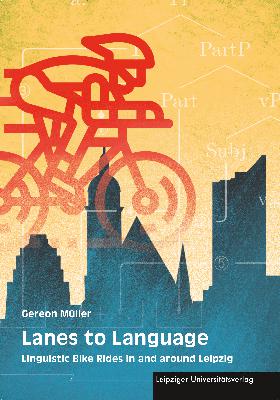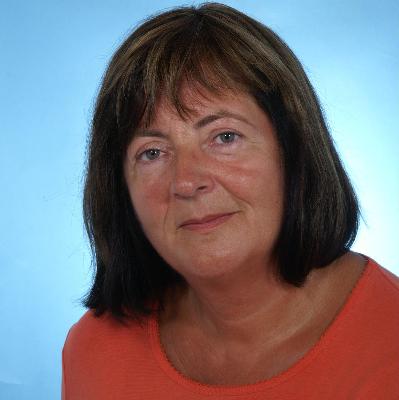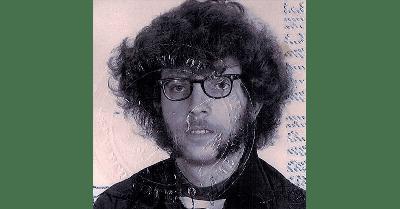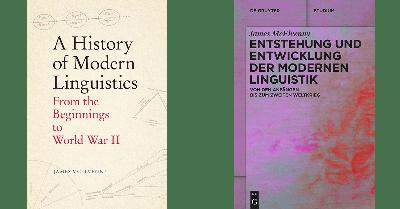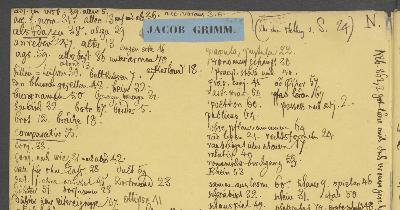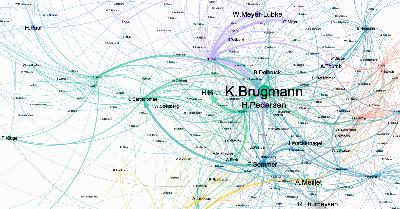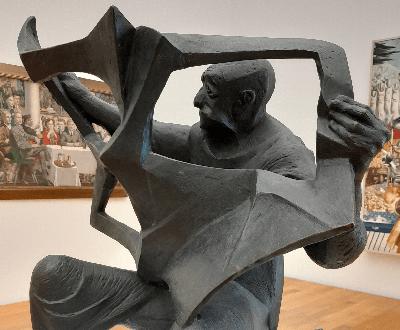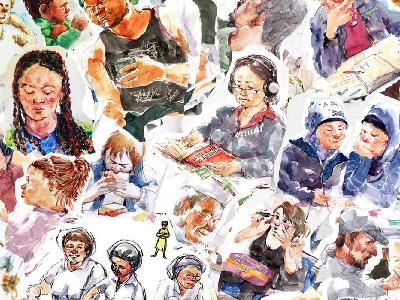Podcast episode 36: Interview with Ghil‘ad Zuckermann on revivalistics
Description
In this interview, we talk to Ghil‘ad Zuckermann about language reclamation and revival in Australia and around the world.
<figure class="wp-block-audio"></figure>
Download | Spotify | Apple Podcasts | Google Podcasts
References for Episode 36
The Barngarla trinity: people, language, land. The Barngarla trilogy: (1) Barngarlidhi Manoo (‘Speaking Barngarla Together’): Barngarla Alphabet & Picture Book, 2019; (2) Mangiri Yarda (‘Healthy Country’): Barngarla Wellbeing and Nature, 2021; (3) Wardlada Mardinidhi (‘Bush Healing’): Barngarla Plant Medicines, 2023. Links to the digital versions of these 3 books, as well as to the Barngarla app, can be found at the following website: https://wcclp.com.au/barngarla/
Anubi, Myra, Shania Richards & Ghil‘ad Zuckermann. 2023. ‘Bringing dead languages back to life‘, People Fixing the World. BBC World Service.
Schürmann, Clamor Wilhelm. 1844. A Vocabulary of the Parnkalla Language. Adelaide: Dehane. Trove
Sivak, Leda, Seth Westhead, Emmalene Richards, Stephen Atkinson, Jenna Richards, Harold Dare, Ghil‘ad Zuckermann, Graham Gee, Michael Wright, Alan Rosen, Michael Walsh, Ngiare Brown & Alex Brown. 2019. ‘“Language Breathes Life”—Barngarla Community Perspectives on the Wellbeing Impacts of Reclaiming a Dormant Australian Aboriginal Language’, International Journal of Environmental Research and Public Health 16, 3918. DOI: 10.3390/ijerph16203918.
Sivak, Leda, Seth Westhead, Graham Gee, Michael Wright, Alan Rosen, Stephen Atkinson, Emmalene Richards, Jenna Richards, Harold Dare, Ngiare Brown, Ghil’ad Zuckermann, Michael Walsh, Natasha J. Howard & Alex Brown. 2023. ‘Developing the Indigenous Language and Wellbeing Survey: approaches to integrating qualitative findings into a survey instrument’, AlterNative. DOI: 10.1177/11771801231194650
Zuckermann, Ghil‘ad. 2003. Language Contact and Lexical Enrichment in Israeli Hebrew. Basingstoke: Palgrave Macmillan.
Zuckermann, Ghil‘ad. 2020. Revivalistics: From the genesis of Israeli to language reclamation in Australia and beyond. Oxford: Oxford University Press. Publisher’s website.
诸葛漫 (=Ghil’ad Zuckermann). 2021. 多源造词研究 (A Study of Multisourced Neologization). Shanghai: East China Normal University Press. Publisher’s website.
Transcript by Luca Dinu
[Instrumental tapping] [00:05 ] [Singing] [00:47 ]
JMc: That was Hazel Cooyou Walgar singing a song in Baiyoongoo. [00:51 ] The title of the song translates into English as ‘My Country’. [00:56 ] Hi, I’m James McElvenny, and you’re listening to [00:59 ] the History and Philosophy of the Language Sciences Podcast, [01:02 ] online at hiphilangsci.net. [01:05 ] There you can find links and references to all the literature we discuss. [01:10 ] Today we’re joined by Ghil‘ad Zuckermann, who’s Professor of Linguistics at the University of Adelaide in South Australia. [01:18 ] Among other things, Ghil‘ad is an expert on language revival and reclamation, [01:23 ] a field that he calls ‘revivalistics’. [01:27 ] In 2020, he published a monograph treating this topic with Oxford University Press under the title [01:34 ] Revivalistics: From the genesis of Israeli to language reclamation in Australia and beyond. [01:41 ] So, Ghil‘ad, what is revivalistics? [01:44 ] Or rather, what does it mean to revive a language? [01:49 ]
GZ: Revivalistics is a new, comparative, global, transdisciplinary field of inquiry [01:59 ] surrounding language reclamation, revitalization and reinvigoration [02:05 ] from any angle possible [02:08 ] — for example, mental health, law, anthropology, [02:14 ] sociology, politics, colonization studies. [02:20 ] What is language revival? You see, language revival is on a spectrum. [02:27 ] The most extreme case of language revival is what I call reclamation. [02:33 ] Reclamation is when you have no native speakers of the language you are trying to revive. [02:40 ] This is in the case of a sleeping beauty like Hebrew. [02:43 ] Hebrew was a sleeping beauty [02:45 ] — meaning no native speakers — since 135 AD for 1,750 years. [02:52 ] Or a dreaming beauty [02:54 ] — so a dreaming beauty alluding to Jukurrpa, the Dreamtime or the Dreaming, [03:00 ] such as the Barngarla, Aboriginal language of Eyre Peninsula. [03:05 ] You had no native speakers of Barngarla for, say, 50 years, 60 years, since the 1960s. [03:13 ] And reclamation is a severe case because you have nobody to listen to who is a native speaker. [03:22 ] Now, on this spectrum, in the middle, you have what I call revitalization. [03:27 ] So revitalization is of a language that is severely endangered, [03:32 ] but it still has some elders speaking it. [03:35 ] For example, Adnyamathanha. [03:37 ] Adnya means ‘rock’ and mathanha means ‘people’, so Adnyamathanha rock people. [03:44 ] These are the Aboriginal people of the Flinders Ranges, [03:47 ] not that far from Adelaide. [03:50 ] And I have a friend called Robert Wilton. He’s in his 80s, and he is a native speaker of Adnyamathanha. [03:59 ] In the case of Adnyamathanha, [04:02 ] the percentage of native speakers among children is almost zero. [04:08 ] And of course, in order to determine whether a language is endangered, I don’t care about numbers. [04:13 ] I only care about percentage of children within the tribe speaking the language. [04:18 ] So, for example, Pitjantjatjara is alive and kicking, [04:21 ] even though it is only spoken by 3,500 people, [04:25 ] but, say, almost 100% of kids speak it. [04:29 ] Whereas you might have some languages in Africa with a million speakers, but they’re severely endangered [04:35 ] because the percentage of children speaking the language is very low. [04:40 ]
JMc: So is your understanding of a native speaker someone who learns language in this critical period [04:45 ] as it’s understood by generative linguists? [04:47 ]
GZ: Yes, and in fact, I would say he or she does not learn, but rather acquires automatically. [04:52 ] So, say, I’m a native speaker of Israeli, [04:55 ] you’re a native speaker of Australian English. [04:59 ] We both speak many other languages, but we learned them thereafter. [05:06 ] Now, in the kind of other side from reclamation, so we said reclamation, revitalization, and then you have reinvigoration. [05:17 ] Reinvigoration is when you have a relatively high percentage of kids speaking the language, but still not 100%. [05:24 ] The language is endangered. [05:27 ] Welsh, maybe Irish, still very endangered, but it’s not as bad as Adnyamathanha, definitely not as Barngarla. [05:35 ] So in the case of revitalization, which is kind of in the middle, and reinvigoration, [05:43 ] we can, for example, use a technique called master-apprentice because we have a master. [05:50 ] We have somebody who speaks the language natively. [05:53 ] This is in diametric opposition to the case of reclamation where we have no masters whatsoever. [05:58 ] Now, what is the master-apprentice technique? [06:01 ] You take a master, usually an old person who is a native speaker of the language, who, as you said, [06:06 ] had acquired the language automatically, say, between the age of zero and puberty, [06:13 ] and you ask this master to adopt, if you want, an apprentice. [06:19 ] An apprentice is a young person — can be a child, can be a teenager — who do not speak the language, [06:27 ] but they would help the master with daily tasks, shopping, etc., [06:34 ] and the master would speak to them only in language. [06:38 ] So the idea in the case of revitalization and reinvigoration [06:43 ] is to reintroduce the language to youngsters [06:47 ] who will then become native speakers or at least



